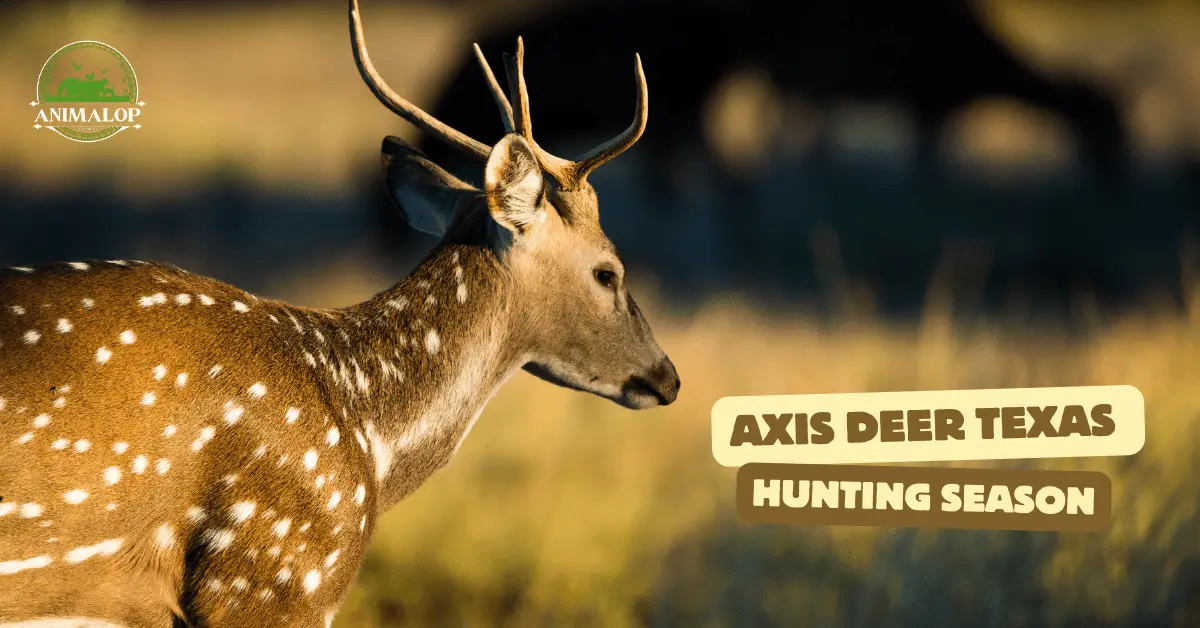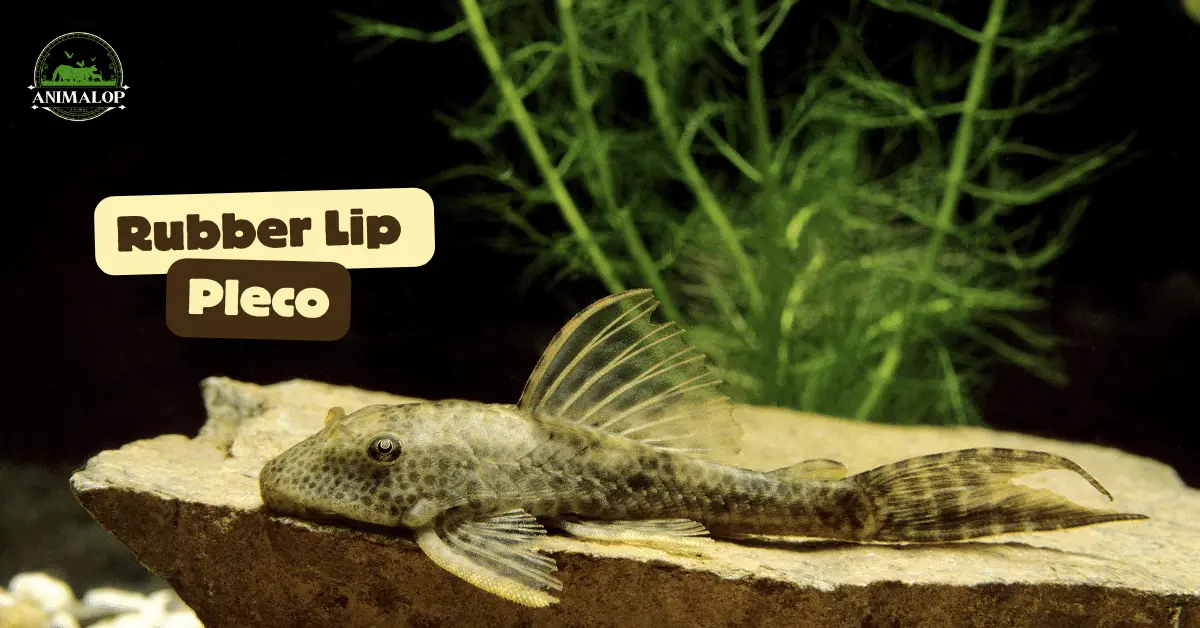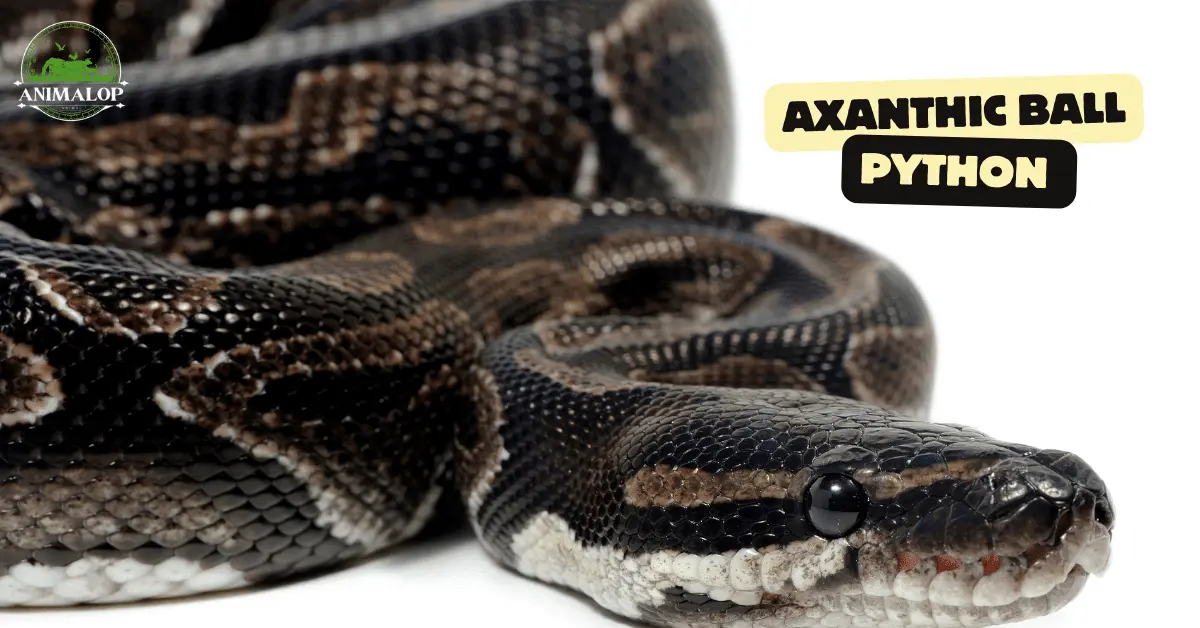Do you know about the deer in Texas with patterns like a baby deer but aren’t? What’s special about these spotted Axis deer? Axis deer in Texas are easy to recognize because they have an orange coat with white spots, similar to baby whitetail deer.
Both grown-up males and females have white patches on their necks, but only the males have antlers, usually with about 6 points each. Female axis deer don’t get antlers and weigh between 90 to 150 lbs, while males are heavier, weighing between 150 to 250 lbs.
Axis deer act a lot like the local whitetail deer, being most active during early morning and late evening, usually hanging out in groups of males and females both of different ages all year round. Let’s talk about this Axis deer Texas breed in detail below!
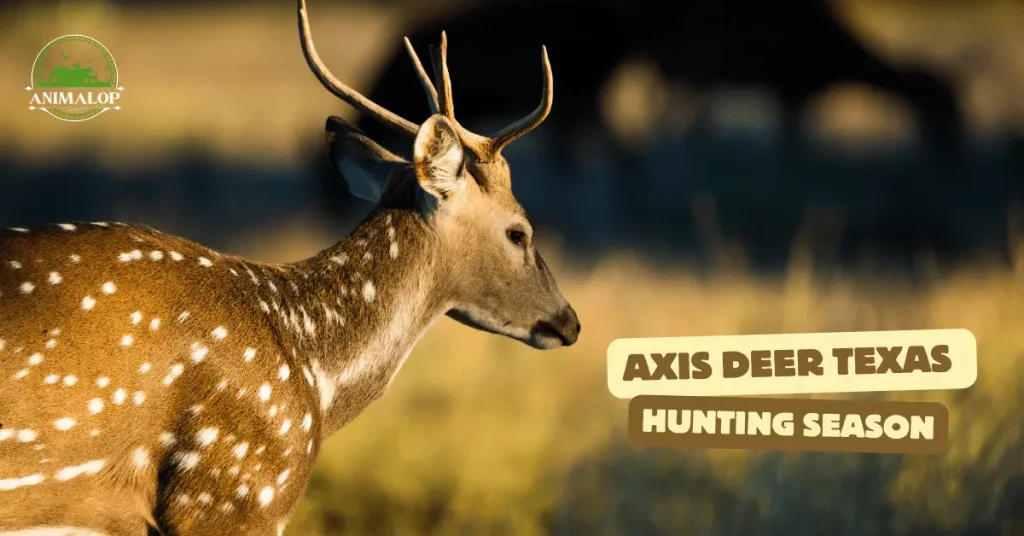
Axis Deer Texas Breed: Quick Profile Review
Axis Deer Texas History And Origin
Axis deer, also known as chital in India, were originally brought to Texas for hunting and food back in around 1932. People kept them on farms or special hunting areas. But since they got here, some axis deer have gotten out and made Texas their home.
Now, they live in many parts of central and southern Texas, with over 15,000 of them roaming free and another 40,000 on private hunting lands. Among wild deer from other countries in Texas, they are the most common.
Axis Deer Texas Current Location
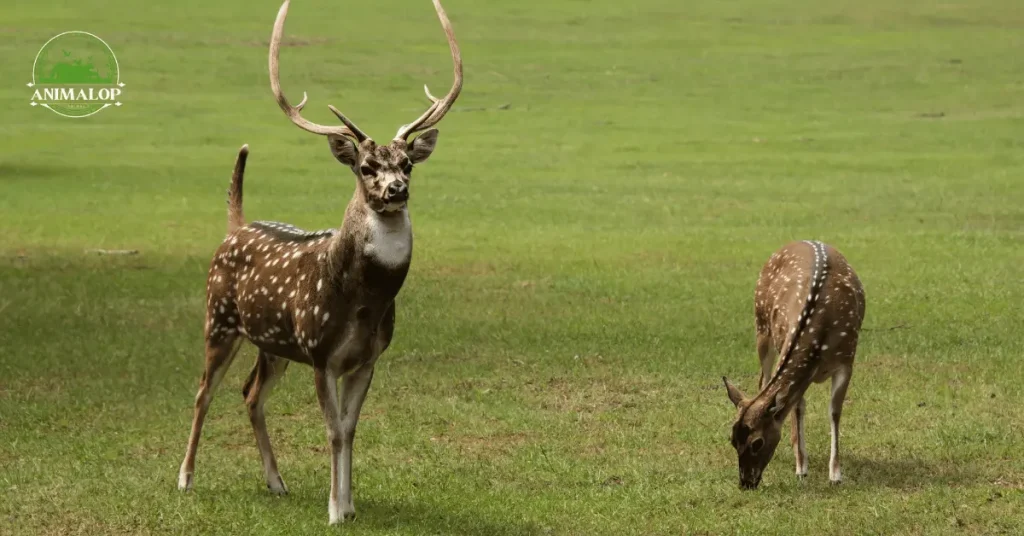
Right now, you can find Axis deer in Hawaii, California, and Texas. Axis deer in the U.S. like to eat grass and plants in open fields that are close to forests or places where they can hide.
They’re often out in the open when it’s warm, but they mostly move around early in the morning or late in the evening. Because they like warm weather, they do really well in Texas.
Axis Deer Texas Hunting Season
The suitable time to hunt Axis Deer in Texas is usually from May to July, when they are in their mating season.
In these months, male Axis Deer are more active and easier to hear, even though it can get really hot during these months, so the cooler mornings and evenings are good times to hunt. The sounds that the males make also help hunters find the big ones.
You can hunt Axis Deer in Texas any time of the year. Unlike other animals that can only be hunted during certain seasons, there’s no set season for Axis Deer.
So, the hunters could plan their trips whenever they want. Since Axis Deer are seen as an invasive species, there aren’t many rules about hunting them.
Axis Deer Texas: Hunting Techniques
When hunting Axis Deer, the technique changes with the seasons. In the summer, especially during their mating season, we start early in the day at high places to listen for the males making noise.
Then, we quietly creep up on them as they move between their resting and eating areas. In the afternoon, we focus on areas near water because deer always come to drink. Setting up hidden spots near water holes works really well, and we can even use cameras to track their movements.
During winter, we usually hunt from comfortable areas overlooking places where deer come to eat. These hunts can also include hunting for Whitetail Deer or other animals. Our hunts are very successful, with almost everyone getting a deer. The deer we get usually have antlers that are pretty long, with some being even bigger.
Axis Deer Texas Personality
The Axis deer, also called chital, comes from the Indian subcontinent. Mostly people consider it the prettiest deer because of its bright red coat with white flecks that stay for its whole life.
The males have big but simple antlers, mostly with three points. They have a dark stripe down their back and white fur on their ears, the insides of their legs, and their throat. They also have a short tail, and their overall look is very elegant.
Axis Deer Texas Facts
Axis deer are popular for hunting in the U.S.
They can run as fast as 40 mph and overcome obstacles as high as 6 feet.
They can damage the environment and economy on islands by eating up native plants.
Their lifespan ranges from 9 to 13 years when living in the wild.
In captivity, they can live between 18 to 22 years.
Can You Hunt Axis Deer At Night In Texas?
In Texas, Axis Deer aren’t considered state-owned game, which means you just need a basic hunting license to hunt them. So the hunters are allowed for hunting Axis Deer at any time – day or night – and during any season throughout the year.
The flexibility of timing makes Axis Deer hunting more accessible since there aren’t strict regulations on when and how you can hunt them, compared to other types of game where specific seasons and times are enforced for hunting.
When Do Axis Deer Shed Their Antlers In Texas?
Axis Deer in Texas drop their antlers once every year, but unlike other deer, they do it around their birthday, which could be any time of the year. So you may see Axis Deer with or without antlers at various times, not just in one season.
They belong to the deer family but aren’t affected by the Chronic Wasting Disease (CWD) regulations that apply to some other deer species. Axis Deer are easy to identify with their bright reddish-brown coat that keeps its white patches for their whole life, making them unique compared to other deer whose marks disappear as they grow older.
Axis Deer Breeding
Axis deer can have babies throughout the year, but they mostly mate in the early summer, between May and July. It means most of their babies, usually just one at a time, are born the next spring. These deer are really good at having babies so much so that it’s uncommon for hunters to find a female Axis deer that isn’t either expecting a baby or taking care of one.
Female Axis deer carry their babies for about 7 and a half months before giving birth. It’s not unusual for them to have up to 4 babies over the span of 3 years, showing how frequently they can reproduce.
Axis Diet in Texas
Axis deer in Texas aren’t picky eaters and will munch on a wide range of plants, including grass, some flowering plants, and leaves from trees or bushes. This is different from White-tailed deer, who are more choosy and mainly eat flowering plants and leaves.
Axis deer usually go for short, green grasses and are known to eat plants like gramas, Indian Grass, Little Bluestem, Paspalum, and Switchgrass. In the spring, they also like to eat a lot of sedges (a type of plant that’s similar to grass).
A study done by some researchers in 1988 looked at what Axis deer and some other deer-like animals eat by checking out what was in the stomachs of 20 Axis deer. They found out that Axis deer, along with Fallow deer and Blackbuck antelope, mostly ate grass, making up more than 93% of their diet in the Edwards Plateau area (source).
Cost To Hunt Axis Deer In Texas
Hunting an Axis deer in Texas can cost you anywhere from $1,750 to $5,500 for a buck and between $350 to $800 for a doe. Some places throw in a 2-night stay and an Axis doe for free if you pay to hunt a buck. Other places might charge you a daily rate on top of the hunting fee.
Staying costs can range from $200 to $600 per day, depending on how fancy the place is. These prices usually cover your stay, three meals a day (some of my best meals were at these ranches), and any drinks.
Keep in mind, the fancier or more exclusive the ranch, the higher the price might be for hunting the same size buck.
I’ve seen a decent-sized 32” buck’s price vary from $2,200 to $3,750 based on the ranch. The price could change based on how big the buck is and what kind of accommodations the ranch offers.
Most bucks you’ll see in these price ranges are about 30-32” inches, which are considered pretty good.
The record-breaking Axis deer, which are over 35” inches and might have extra features like drop tines or more than 8 points, start at prices around $4,200. The biggest Axis ever recorded came from India and had antlers over 41 inches long.
Axis Deer Meat
Axis deer meat is known for being really lean and has a milder taste compared to other deer meat, making it less “gamey.” From my own experience, I can say I like Axis deer meat more than Whitetail or any other kind of wild meat.
A group called the Exotic Wildlife Association rated Axis deer meat as the best tasting out of all wild game meats. It’s so low in fat, having less than 1% fat content, that it can be sold as fat-free (source).
Sometimes, ranches will gather several Axis deer for slaughter and have a USDA certified mobile meat processor come directly to the ranch to handle the meat right there.
The site also mentions that these mobile processors can take up to 38 animals in one go, so that’s the number they aim for when a trailer comes to the ranch.
FAQs
Final Thoughts
I hope you found this piece on Axis Deer in Texas interesting. This is just one of the many articles where I aim to teach landowners and help everyone learn more about deer breeds. Feel free to browse other articles on the site and share them with anyone who might like this info too.

